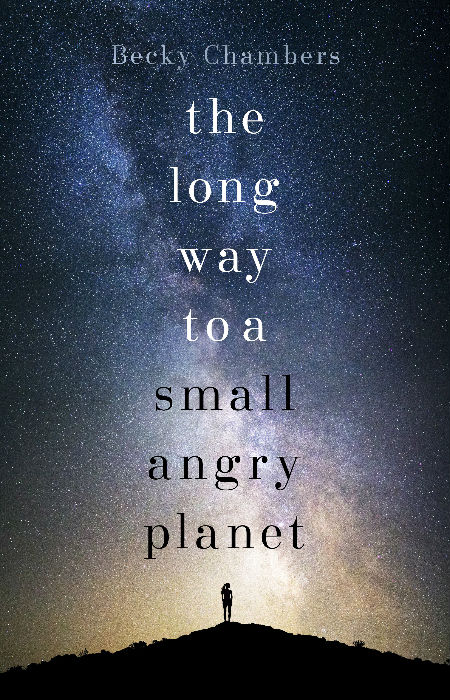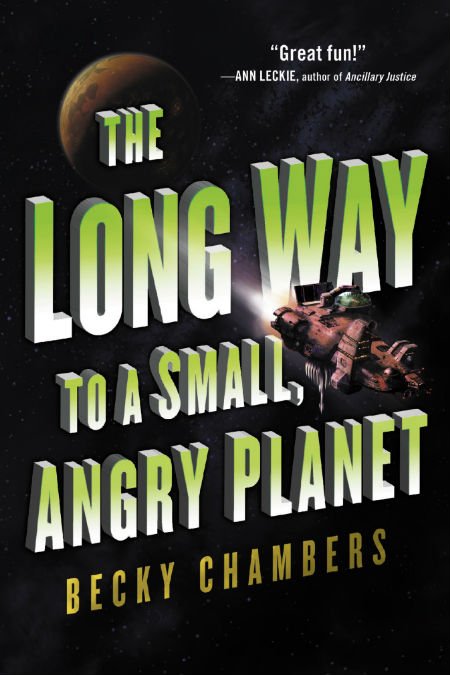
It would be hard to argue with the fact that humanity has, over the countless eons of its existence, provided a plethora of reasons why its future shouldn’t be every bit as fractious and be devilled as its past.
And yet, for all the evidence stacked high to the rafters to the contrary, there are still a great many people who believe that Homo Sapiens can pull an unexpected idealistic rabbit out of the hat and advance somewhere admirably humanistic, the sort of place that people like Gene Roddenberry, who gave us the wonders of Star Trek and its far less blighted world, would happily recognise.
One of those people is Becky Chambers, a writer who grew up in a family steeped in space science, an upbringing that seems to have predisposed her to the idea that we are not only capable of greatness but that it can emerge despite ourselves.
“That was the thing that had hammered home just how far from Sol she was – the menagerie of sapients standing alongside her in the ticket line. Her homeworld was fairly cosmopolitan, but aside from the occasional diplomat or corporate representative, Mars didn’t see much in the way of non-Human travellers.” (PP. 12-13)
In the universe in which the events of her debut novel, The Long Way to a Small Angry Planet, take place, humanity has managed, through sheer luck and happenstance mainly, to survive the near-extinction of life on Earth.
The planet itself remains intact, populated by Gaiaists, far right environmental extremists who believe it’s humanity’s once and only future home, no alien assistance needed thank you very much, but most of its inhabitants have scattered to the stars; the rich to Mars and other inner Sol system planets and moons, and the less well-off to systems well beyond that, courtesy of refugee fleets that took off into the galactic unknown in search of a viable future.
This desperate roll of the dice, which consigned the rest of our self-destructive species to die an ignominious, self-perpetrated death on a dying world, found success, thanks in part to the ingenuity of the Exodans, as they are known, but mainly, think many, to the intervention of the Aeluons, a highly-advanced, highly-cultured race of learned silver beings, who championed humanity’s right to a second chance, largely by way of membership of the Galactic Commons (GC), Chambers brilliantly-grounded take on Roddenberry’s Federation.
In this community of aliens, in which the Aeluons, the lizard-like Aandrisk (thought don’t use that Earth animal-allusion to their face as its considered quite speciesist) and the onetime hardline rulers of the galaxy, the blob-like Hamagians are the top three races, humanity has found a happy, though not always perfect niche, one in which Captain Ashby and the crew of the Wayfarer have carved a successful career as subspace tunnelers, responsible for linking the GC via a series of stable, civilisation-sustaining wormholes.

While the amazingly-detailed future world that Chambers has created for The Long Way to a Small, Angry Planet is a delight in every way, presented with a kind of matter-of-factness that invests a galaxy of multi-species mingling and mostly harmonious politicking with an admirable authenticity and truthfulness, it’s the characters who populate the Wayfarer that are the true joy of the highly-readable, joyously optimistic book.
Unlike other authors who may see perpetual acrimony and infighting as the way to engaging, intensely-readable drama (and yes, let’s face it, that does work a treat, even if it does get a little exhausting), Chambers has taken a leaf out of Firefly’s book, though not at all derivatively, and given us a crew who actually, for the most part, like each other.
More than that, with the exception of grumpy algae-fuel chemist Corbin, who dislikes pretty much everyone, they are a family, a do-anything-anytime grouping of people including techs Jenks and Kizzy (who’s a firebrand of delightfulness), Aandrisk pilot Sissix, Sianat Pair Ohan (this race deliberately infects itself with a virus that heightens its mathematical and scientific skills, thought at great physical and social cost) and Dr Chef, one of the few remnants of a near-extinct race, into which troubled Martian exile Rosemary steps as an admin officer.
“Ashby sat at his desk, staring out the window, trying to get it into his head that it wasn’t his fault. He’d thought the words over and over, but they refused to stick. What did stick were all the things he couldn’t done instead. He could’ve asked more questions. He could’ve called one of the carriers the minute that Toremi ship showed up. He could’ve turned down the job.” (P. 372)
While there is drama aplenty at times, ranging from piracy through to inter-species conflict, the focus is firmly on the crew, and much of the novel’s endlessly readable time – trust me you will fly through this accessible but emotionally substantial book almost as fast as the Wayfarer digs wormhole tunnels – is devoted to getting to know them, to understanding what brought them together as a family (in Sissix’s case, quite literally) and to celebrating how a disparate group of people can come to mean so much to each other.
This is The Long Way to a Small Angry Planet‘s real joy.
It doesn’t pretend the galaxy is perfect, and in fact, much of the narrative is driven by the fact that a tenuous peace in the galactic core between the GC and the tribal Toremi, but it acknowledges that like our present day, that this doesn’t preclude real, deep connections between people, selfless, unbounding relationship that go far beyond doing the least bit necessary, and a palpable, transcendent sense of belonging.
Lest you think it’s some giddy hurtle through an overly optimistic universe, the book is firmly rooted in the reality and ways of a pragmatic galaxy, but rather than throw its existential hands up in despair and declare all is lost without hope of reprieve, Chambers dares to argue, through characters you will come to love and adore in a way few manage, that being hopeful about our hapless species is not such a silly idea after all, and we might just make it after all.